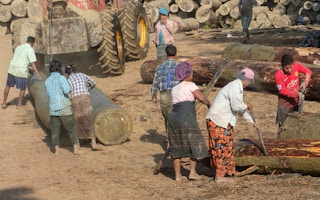In the midst of political chaos fomented by a Feb. 1 military coup of the government in Myanmar, the country’s forestry sector is seeking legitimisation from the international community.
A statement from the nationally privatised Myanmar Forest Products and Timber Merchants Association (MFPTMA), with an oddly business-as-usual tone, claimed timber exports are “trading legally and officially,” despite the armed takeover that came with a one-year expiration date.
In response to the statement, the UK-based Environmental Investigation Agency (EIA) refuted the notion that Myanmar is abiding by EU Timber Regulations (EUTR) and certification standards like EU’s Forest Law Enforcement, Governance and Trade (FLEGT).
“EIA has for the past decade exposed the blatant theft of Myanmar’s forests, the high-level corruption that starts at the top of the military regime and the crimes committed in forest-rich areas upon which the people of Myanmar rely for their security and livelihoods,” EIA senior spokesman Paul Newman said in a statement last week.
The one-year state of emergency imposed by the military has seen a host of civil society leaders detained — including officials from the National League for Democracy, as well as civilian leaders and activists. Communications have been sporadic after a virtual blackout at the start of the month.
According to a statement sent after the coup and shared by the EIA last week, the MFPTMA says it wants international support to continue selling timber to EU countries. The statement includes vague references to legality protections that have proved ineffective in stopping the rampant destruction of Myanmar’s forests. The Southeast Asian country has long been rife with corruption connected to the timber industry, particularly within the military, and has fallen victim to timber theft from neighboring countries like Vietnam.
“
EIA has for the past decade exposed the blatant theft of Myanmar’s forests, the high-level corruption that starts at the top of the military regime and the crimes committed in forest-rich areas…
Paul Newman, senior spokesperson, Environmental Investigation Agency
Despite that, myriad efforts were underway to reform reckless, illegal practices in the international arena prior to the Feb. 1 coup. According to the EIA, that’s no longer the case.
“An opportunity existed … for governance and technical reform within the sector, which was supported by the international community, civil society, professional foresters and some private sector,” Newman said in his statement. “This can no longer be the case as there is now a military-installed government ruling in all aspects of the country and benefitting only the regime.”
Since the 1800s, Myanmar’s forests have been excessively logged due to the presence of a sought-after tree: the native teak (Tectona grandis), highly prized in the furniture and yacht-making industries. The biggest buyers of Myanmar’s wood are China, India and Thailand, which collectively imported 4.04 million cubic meters (143 million cubic feet) of teak logs and sawn timber — worth $2.79 billion — from Myanmar between 2007 and 2017, according to an EIA report. The U.S. and EU import smaller amounts from Myanmar, but these markets are still worth tens of millions of dollars.
But the timber trade in Myanmar has been marked with “fraud, bribery, corruption and other forms of illegality for at least two decades,” which has prevented any attempts at government reform, the EIA report says.
In its recent letter, the MFPTMA says it complies with the EU’s Timber Regulation (EUTR), a policy meant to counter illegal timber. Yet Faith Doherty, EIA’s forests campaign team leader, says Myanmar has never complied with the EUTR.
“To this day, the European Union has said that Myanmar is not able to comply with that law,” Doherty told Mongabay in an interview. “And one of the fundamental reasons is the lack of transparency, and the lack of access to the forest to monitor what is happening. They [MFPTMA] are able to provide paper where they can tick boxes, and the letter … is saying it’s all legal and we’ve got a green book that says it, but there’s no verification. It’s completely opaque.”
David Hopkins, chief executive of the Timber Trade Association (TTF), a UK federation of timber traders, says the EUTR requires proof that any goods have not been sourced illegally.
“With Myanmar, you simply can’t do that,” Hopkins told Mongabay in an interview. “There’s just no visibility for anyone to make an accurate assessment, and so you cannot really say for sure that there’s no risk of illegal harvested material entering the supply chain.”
Hopkins added that none of the traders within the TTF have imported timber from Myanmar since 2016, which is when the EU placed an embargo on Myanmar timber. The embargo was lifted in 2017, but the TTF did not change its policies.
Doherty says she believes the letter from MFPTMA was simply motivated by financial gain.
“I’ve been working in Burma for 30 years,” she said. “What was so shocking to me was that that letter would be sent two days after a coup, pushing people to buy Myanmar teak. I couldn’t believe it.
“The people who are profiting from the trade are not the people of Myanmar — it’s the military and its individuals and its actors involved,” she added.
Since 1990, Myanmar has lost more than 20 per cent of its forests, according to the EIA.
The EIA has called on Myanmar’s coup leaders to release members of the civilian government and civil society currently in custody, and hand power back to the democratically elected government. The organisation is also encouraging the international community to impose economic sanctions on Myanmar that would directly target the military regime — particularly in regards to the timber trade.
“EIA is pushing for targeted sanctions — not blanket sanctions,” Doherty said. “We’re calling for it — in line with the international call from civil society outside and inside the country — in that it doesn’t harm the ordinary person but that it actually hits the elites and those who are profiting from the coup.”
This story was published with permission from Mongabay.com.










